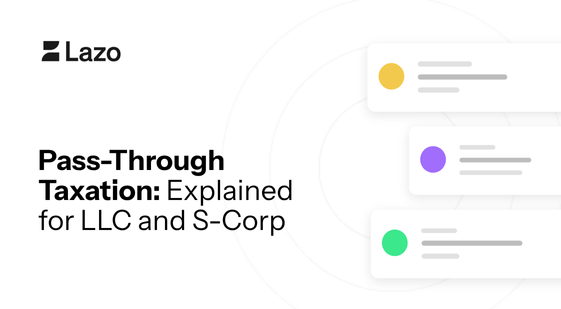Login to your Lazo One account here
Login

For many U.S. startup founders, choosing the right legal structure is a foundational decision that impacts everything from liability protection to fundraising. Among the most popular choices are the Limited Liability Company (LLC) and the S-Corporation (S-Corp). A key reason for their appeal lies in their taxation method: pass-through taxation.
At Lazo, we guide founders through the complexities of U.S. incorporation and tax compliance, ensuring they make informed decisions that support their growth. Understanding pass-through taxation is crucial for managing your startup's finances and personal tax obligations.
Simply put, pass-through taxation means that the business itself does not pay income tax directly. Instead, the business's profits and losses are "passed through" to the owners' personal tax returns. The owners then pay taxes on their share of the business's income at their individual income tax rates.
This is in contrast to a traditional C-Corporation, which is subject to "double taxation": the corporation pays tax on its profits, and then shareholders pay tax again on dividends received.
By default, an LLC is treated as a pass-through entity for federal income tax purposes.
This simplicity is a major draw for many startup founders, particularly in the early stages, as it avoids the complexities and potential double taxation of a C-Corp.
An S-Corp is not a distinct legal entity but rather a tax election made by a corporation or, more commonly, by an LLC. To elect S-Corp status, a company must file Form 2553 with the IRS and meet specific criteria (e.g., must be a domestic corporation, have only one class of stock, and have no more than 100 shareholders).
Like LLCs taxed as partnerships, S-Corps are also pass-through entities. Income and losses are reported on the owners' personal tax returns via a Schedule K-1.
A key tax advantage of the S-Corp election, especially for startup founders who actively work in their business, is the ability to pay themselves a "reasonable salary." This salary is subject to payroll taxes (Social Security and Medicare). However, any additional profits distributed to the owners are typically not subject to these payroll taxes, potentially leading to significant tax savings.
Understanding pass-through taxation is critical because it directly impacts your personal tax burden.
Navigating the nuances of pass-through taxation and choosing the optimal incorporation strategy can be complex. You need a partner who understands the intricate balance between tax efficiency, legal compliance, and your startup's growth ambitions.
At Lazo, our experts provide end-to-end support for U.S. incorporation, tax setup, and ongoing compliance. We help founders like you:
Don't let tax complexities hinder your progress. Partner with Lazo to build a robust legal stack and focus on what you do best: scaling your startup.